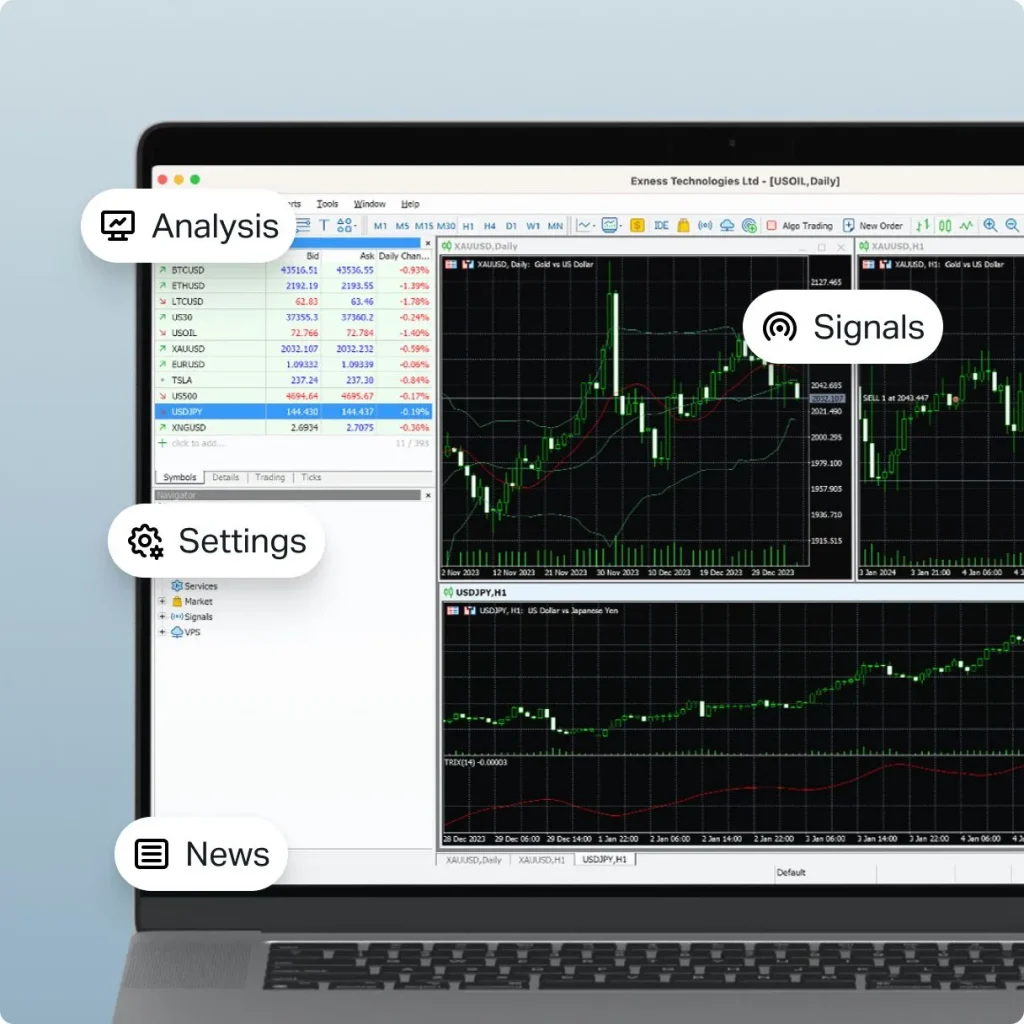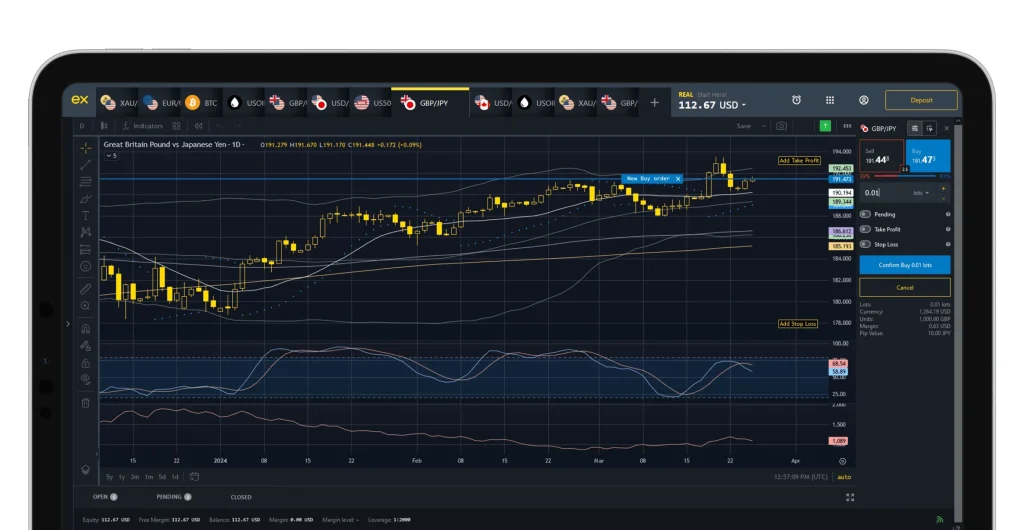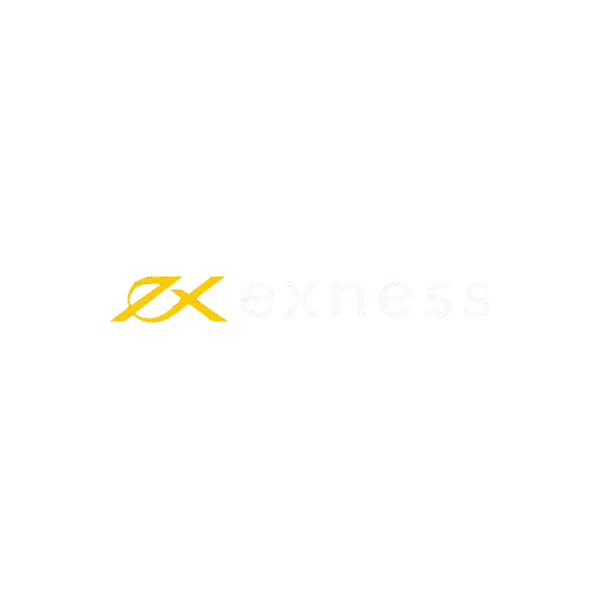Home » Exness MetaTrader 4
MetaTrader 4 (MT4) remains one of the most widely used trading platforms globally. Launched in 2005 by MetaQuotes Software, MT4 provides a comprehensive environment for trading forex, commodities, indices, and cryptocurrencies. This guide covers the platform’s key features, installation process, and essential functions.
Platform Overview
MT4’s enduring popularity stems from its balance of powerful features and user-friendly interface. The platform offers extensive charting capabilities, automated trading systems, and customizable environment—all while maintaining relatively modest system requirements.
Core Capabilities
MetaTrader 4 delivers these essential trading functions:
- Real-time market data with customizable price charts
- Multiple order types including market and pending orders
- 30+ built-in technical indicators and analytical objects
- Expert Advisors (EAs) for automated trading
- Custom indicators and scripts through MQL4 programming
- Secure trading environment with encrypted communications
The platform comes in multiple versions: desktop client for Windows, mobile applications for iOS and Android, and web terminal for browser-based access.

Installation Process
Desktop Setup
Installing MT4 on Windows follows these steps:
- Download the installation file from your broker’s website
- Launch the installer and follow the wizard prompts
- Select installation location (default recommended)
- Wait for installation completion
- Launch platform from desktop shortcut
The installation requires approximately 250MB of disk space and completes within minutes on most systems.
Mobile Installation
For mobile devices:
Android: Download MT4 from Google Play Store
iOS: Install from Apple App Store
Both mobile versions require approximately 100MB of storage space and support most modern devices.
Platform Interface
The MT4 interface consists of several key components that organize trading tools and information effectively.
Main Windows
The standard layout includes:
Market Watch: Displays available trading instruments with bid and ask prices
Navigator: Provides access to accounts, technical indicators, and expert advisors
Chart Window: Shows price movements for selected instruments
Terminal: Multi-tabbed panel for trade management, account history, and alerts
The interface can be customized to match individual preferences through window arrangements, color schemes, and toolbar configurations.
Account Setup
Accessing MT4 requires proper account credentials from a supporting broker.
Live Trading
For real account access:
- Launch MT4 application
- Select “File” → “Login to Trade Account”
- Enter trading account number and password
- Select correct server from dropdown
- Click “Login” button
Always verify the server selection matches your broker’s requirements for successful connection.
Demo Accounts
New users can create practice accounts through:
- Launch MT4 platform
- Select “File” → “Open an Account”
- Choose your broker from the list
- Select “New demo account” option
- Complete registration form
- Receive login credentials automatically
Demo accounts provide full platform functionality with virtual funds for risk-free practice.

Trading Operations
MT4 supports various order types and execution methods to accommodate different trading strategies.
Order Types
The platform handles these primary order categories:
Orders can be placed through:
- Order window (F9 key)
- One-click trading from chart
- Right-click menu on charts
- Expert Advisor automated execution
Market Orders: Immediate execution at current market price
Pending Orders: Execution when price reaches specified level
- Buy/Sell Limit
- Buy/Sell Stop
- Buy/Sell Stop Limit
Position Management
Active positions can be managed through:
- Modification of stop loss and take profit levels
- Partial or complete position closure
- Trailing stop implementation
- Position monitoring through the Trade tab
Technical Analysis Tools
MT4’s charting system provides comprehensive analysis capabilities through various visualization options and indicators.
Chart Types
The platform supports three primary chart styles:
- Line charts (simplified price movement)
- Bar charts (OHLC price representation)
- Candlestick charts (enhanced price action visualization)
Charts can be viewed across nine timeframes ranging from 1-minute to monthly intervals.
Indicators and Drawing Tools
Drawing tools allow creation of:
- Trendlines and channels
- Fibonacci retracement/extension
- Support/resistance levels
- Text annotations and shapes
MT4 includes:
- Trend indicators (Moving Averages, MACD, Parabolic SAR)
- Oscillators (RSI, Stochastic, CCI)
- Volume indicators (Volumes, OBV)
- Custom indicators from third-party developers

Automated Trading
Expert Advisors (EAs) represent one of MT4’s most powerful features, enabling automated execution of trading strategies.
Strategy Testing
Before live deployment, test EAs using:
- Open Strategy Tester (Ctrl+R)
- Select EA and trading instrument
- Define testing period and method
- Run the test and analyze performance report
The strategy tester helps optimize parameters and validate strategy effectiveness before risking real capital.
EA Implementation
Set up automated trading through:
- Install EA files in the platform’s Experts folder
- Attach EA to chart by drag-and-drop from Navigator
- Configure parameters in properties dialog
- Enable “Allow live trading” in settings
- Activate AutoTrading button in toolbar
Mobile Trading Features
MT4 mobile applications provide essential trading capabilities for iOS and Android devices.
Mobile Functionality
Key features include:
- Real-time quotes and notifications
- Chart analysis with basic indicators
- Full order placement and management
- Account monitoring and history review
- Push notifications for market events
- Biometric authentication options
While more limited than desktop versions, mobile apps deliver core trading functionality for traders on the move.
Platform Customization
MT4 offers extensive personalization options to enhance trading efficiency.
Templates and Profiles
Save configurations through:
Templates: Store chart-specific settings including indicators, objects, and colors. Apply templates to any chart for consistent analysis.
Profiles: Save entire workspace layouts including multiple charts, indicators, and window arrangements. Switch between different profiles for various trading strategies or market sessions.
MT4 vs. MT5 Comparison
While MT4 remains popular, MetaTrader 5 offers additional features:
Feature | MetaTrader 4 | MetaTrader 5 |
Market Access | Primarily Forex/CFDs | Multi-asset (includes stocks, futures) |
Timeframes | 9 | 21 |
Order Types | 4 pending order types | 6 pending order types |
Economic Calendar | No | Built-in |
Strategy Tester | Basic | Advanced with optimization |
Despite MT5’s advanced features, many traders prefer MT4 for its simplicity, established EA ecosystem, and wider broker adoption.
Troubleshooting Tips
When experiencing issues with MT4:
Data Problems:
- Refresh market data (F2)
- Check symbol properties
- Verify data visibility settings
- Use History Center to download missing data
Performance Issues:
- Limit open charts and indicators
- Close unused platform features
- Update to latest build version
- Ensure adequate system resources
Connection Problems:
- Verify internet connectivity
- Check broker server status
- Confirm correct server selection
- Review firewall and security settings
Frequently Asked Questions
Is MetaTrader 4 free to use?
Yes, MT4 is free to download and use. Brokers provide the platform to their clients without additional charges.
Can I use MT4 on Mac computers?
MT4 has no native Mac version but works through compatibility solutions like Wine, PlayOnMac, or virtualization software.
How do I update my MT4 platform?
MT4 updates automatically when new versions are available. You can also check for updates manually through Help → About → Check for Updates.
Why can't I see all available trading instruments?
Right-click in Market Watch window and select “Show All” to display all available symbols. Your broker determines which instruments are available.
Can I trade cryptocurrencies on MT4?
Yes, if your broker offers cryptocurrency CFDs. These appear as standard symbols in your Market Watch window.


